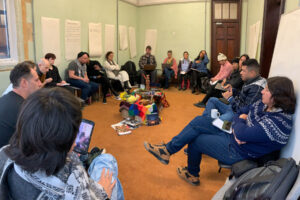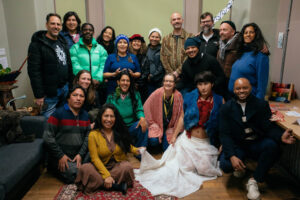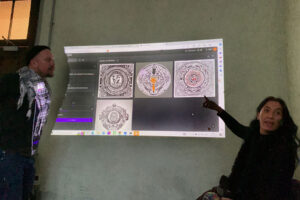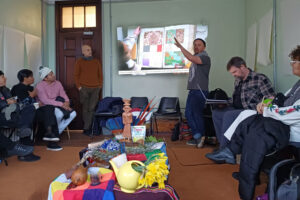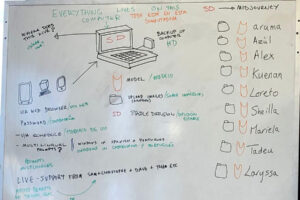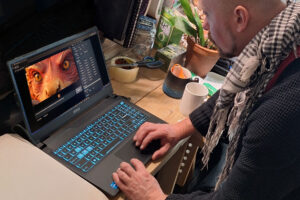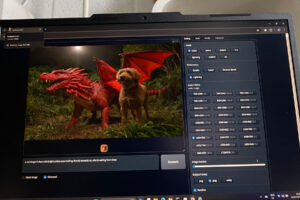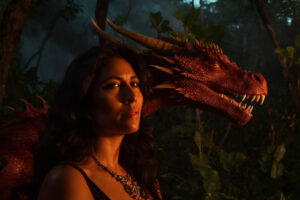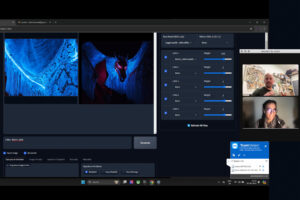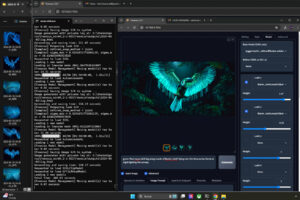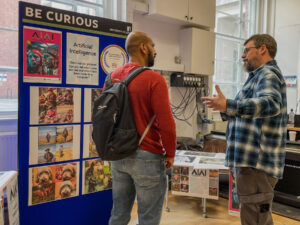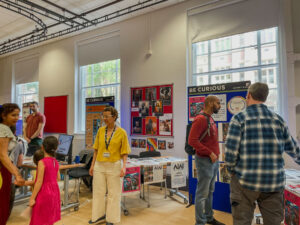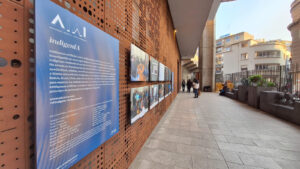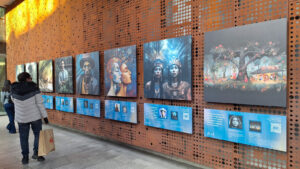IndigenIA
The second stage of the AIAI project was carried out in Leeds in March 2024 and focused on the design of a bespoke Indigenous AI image generation tool which we chose to call IndigenIA. The tool is based on Stable Diffusion and located on an individual laptop (called Dragon) which is accessed remotely by participants. It allows each individual participant to train their own model and thus create images that respond more closely to the Indigenous realities and aesthetics they want to represent.
This stage of the project was organised by Thea Pitman, Andreas Rauh, Sebastián Gerlic (Thydêwá), Sandra De Berduccy (aruma) and the Brazilian researcher, Alessandra Mello Simões Paiva. It was conducted in collaboration with the British artist-technologist collective Immersive Networks (Dave Lynch, Sam Hallas and Christophe de Bézenac), and the following participants: Azul (Mapuche), Kuenan Tikuna, Loreto Millalén (Mapuche), Mariela Tulián, Tadeu Dos Santos Kaingang y Sheilla Souza (Coletivo Kókir), Alex Potiguara, and Laryssa Machada. It was funded by the Enhancing Research Culture Fund, University of Leeds.
The AIAI project was recently selected to be part of the Ficciones Generativas (Generative Fictions) group exhibition at the Galería Gabriela Mistral in Santiago de Chile, 11 June-13 July 2024).It also formed the basis of our participation in the University of Leeds ‘Be Curious’ family fun day in May 2024. A forthcoming exhibition is planned for Dublin Botanical Gardens in November 2024.
Alex Potiguara produced a report on the Leeds workshop (VIEW) and aruma produced a report on the workshop and preparations for the GAM exhibition. (VIEW)
Tadeu dos Santos Kaingang offered the following evaluation of the impact of the project:
The intersection between visual arts, Indigenous peoples and technologies in the context of decolonial education is a topic of great importance and contemporary relevance. [...] Visual arts play a crucial role in expressing and preserving the cultures of original peoples. Through art, they share not only aesthetic expressions but also unique cultural and cognitive experiences. When Indigenous peoples share their arts, they are sharing an essential part of their identity and connection to their ancestral roots.
The introduction of digital technologies offers new opportunities and challenges. On the one hand, digital tools make it possible to document and preserve cultural traditions in an innovative way. On the other hand, it is crucial to ensure that the use of these technologies respects the autonomy and sovereignty of Indigenous groups, avoiding the reproduction of historical injustices. [...] It is also critical to consider the social and ethical impacts of emerging technologies, especially with regard to marginalized communities. Ethics must guide the development and use of these technologies, ensuring that they benefit everyone in a fair and equitable way.
Ultimately, by recognizing and integrating the visual arts knowledge and practices of Indigenous peoples and using technologies in ethical and empowering ways, we can create a more inclusive and culturally rich future for all societies. Coexistence at the event in Leeds with Indigenous people from Latin America in this research network reinforced an important dialogue and commitment to building a fairer and more interconnected world.




